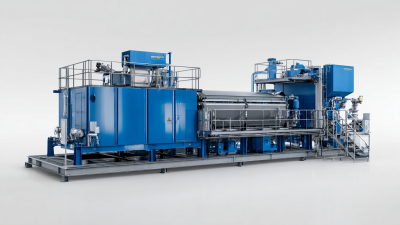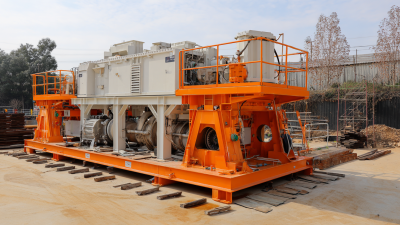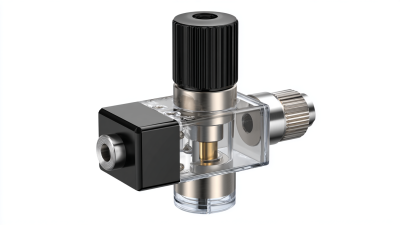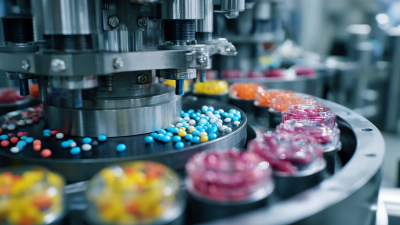The advent of technology has paved the way for innovative solutions across various industries, and the Dewatering Press Machine stands out as a remarkable apparatus that enhances efficiency and sustainability. This powerful machine is designed to extract excess water from various materials, significantly reducing waste volume and facilitating easier disposal or reuse. The unique applications of Dewatering Press Machines span a myriad of sectors, including food processing, wastewater treatment, mining, and agriculture, each benefiting from its ability to improve processes and contribute to environmental conservation. In this blog, we will delve into a comprehensive checklist highlighting the distinctive roles and advantages of Dewatering Press Machines across different industries, showcasing their impact on productivity and sustainability.

Dewatering press machines have emerged as a transformative technology in the mining and mineral processing industries. These machines effectively separate liquid from solid materials, optimizing resource recovery and minimizing waste. In mining operations, where water content in mined materials can be significant, dewatering presses play a crucial role in not only enhancing the efficiency of the separation process but also in ensuring that the extracted minerals meet the market’s quality standards. By ensuring the reduction of moisture content, these machines help in the easy handling and transportation of minerals, reducing costs and environmental impact.
Moreover, the innovative applications of dewatering press machines extend beyond traditional methods. For example, in tailings management, these machines can significantly reduce the volume of tailings generated, allowing for more sustainable mining practices. The dry cakes produced from the dewatering process can be used in backfill operations or even repurposed for construction materials, showcasing the versatility of this technology. As industries look for greener and more efficient processes, the continued integration of dewatering presses will undoubtedly pave the way for advancements in mineral processing, highlighting the importance of sustainable practices in the sector.
This chart illustrates the innovative use of dewatering press machines across different sectors, with focus on mining and mineral processing industries. The data shows their effectiveness in reducing moisture content in materials.
Dewatering press machines have emerged as pivotal tools for enhancing wastewater treatment efficiency across various industries. By mechanically reducing the water content in sludge, these machines not only streamline the dewatering process but also lead to significant cost savings in disposal and transportation. The implementation of dewatering technology helps in producing a drier and more manageable waste product, which can be further processed or repurposed, ultimately supporting sustainable waste management practices.
In industries such as food processing, pharmaceuticals, and mining, the application of dewatering presses has shown remarkable results. For instance, in the food industry, these machines effectively handle by-products such as fruit pulp and vegetable waste, facilitating recycling and composting efforts. In the pharmaceutical sector, dewatering presses assist in the treatment of chemical slurry, minimizing environmental impact. Similarly, in mining operations, they contribute to reducing the volume of sludge generated, making it easier to comply with regulatory requirements while ensuring a cleaner production process. Overall, the integration of dewatering press technology significantly boosts operational efficiency and environmental sustainability in wastewater treatment.
| Industry | Application | Dewatering Method | Benefits |
|---|---|---|---|
| Food Processing | Waste sludge management | Screw Press | Reduces waste volume, enhances nutrient recovery |
| Municipal Wastewater | Primary and secondary sludge treatment | Belt Filter Press | Improves biosolid quality, reduces landfilling |
| Mining | Tailings dewatering | Centrifuge | Maximizes water recovery, reduces environmental footprint |
| Pulp and Paper | Paper pulp dewatering | Vacuum Filtration | Increases fiber recovery, enhances process efficiency |
| Textile | Wastewater treatment | Plate and Frame Press | Improves water reuse, reduces chemical usage |
Dewatering press machines are becoming increasingly vital in the food processing industry, especially in the context of the burgeoning market in India, projected to reach US$535 billion by 2025. These machines play a crucial role in enhancing operational efficiency by effectively extracting moisture from various food products, which is essential for preserving quality and extending shelf life. As the sector witnesses substantial investments, such as the over INR 70 billion allocated under the PLI Scheme, the integration of innovative technologies, including dewatering presses, aligns perfectly with the Food Processing 4.0 concept. This shift towards digital transformation facilitates smarter processing practices, ultimately leading to improved productivity.
Furthermore, the rise of "Food Industry 4.0" heralds new opportunities for dewatering presses. These machines not only streamline the production of high-quality food products but also aid in the sustainable management of by-products. By harnessing advanced process control solutions through digitization and artificial intelligence, manufacturers can optimize their operations, ensuring a more efficient and environmentally friendly food processing framework. This evolution signifies a revolutionary change, enhancing the capabilities of food processors to meet the growing demand while adhering to stringent quality standards.

Dewatering press machines play a crucial role in various industries by significantly reducing environmental impacts associated with waste management and material processing. In sectors such as papermaking and sludge treatment, these machines facilitate efficient separation of liquids from solids, thus minimizing waste volume and enhancing resource recovery. Recent studies highlight innovative applications of enzymatic treatments in dewatering processes, which optimize drainage and improve the quality of the end products, leading to more sustainable production practices.
For instance, the deep-dewatering of sewage sludge utilizing advanced technologies, such as Double Dielectric Barrier Discharge (DDBD) plasma, showcases how modern solutions can enhance dewatering efficiency while lowering energy consumption. By implementing energy-efficient practices in hydraulic pressing, industries can further reduce their carbon footprint and combat environmental pollution. As the push for sustainability intensifies, the integration of dewatering press machines in these processes not only promotes resource conservation but also aligns with global efforts to address climate change and its associated challenges.

Dewatering press machines play a crucial role in the construction and civil engineering sectors, particularly in managing water during excavation and foundation work. These machines effectively remove excess water from soil and slurry, ensuring that construction sites remain safe and operable. With the increasing focus on sustainability and resource efficiency in construction practices, the demand for dewatering press machines is on the rise, aligning with the projected growth in the underground construction equipment market. As the market is expected to expand significantly by 2031, utilizing dewatering technology will be essential for optimizing operations.
Tips for choosing the right dewatering press machine include assessing the specific needs of your project, considering the soil type and moisture levels, and evaluating the machine's efficiency and energy consumption. It is also beneficial to consult with suppliers who specialize in construction equipment to ensure the right fit for your project requirements.
Additionally, integrating dewatering press machines with other equipment, such as screw piles for foundation support, can enhance overall project efficiency. As the North America screw piles market continues to grow, understanding how dewatering technology complements foundation solutions is vital for successful construction outcomes. Maintenance and proper operation of these machines are also key factors that can significantly reduce long-term costs and improve project timelines.






